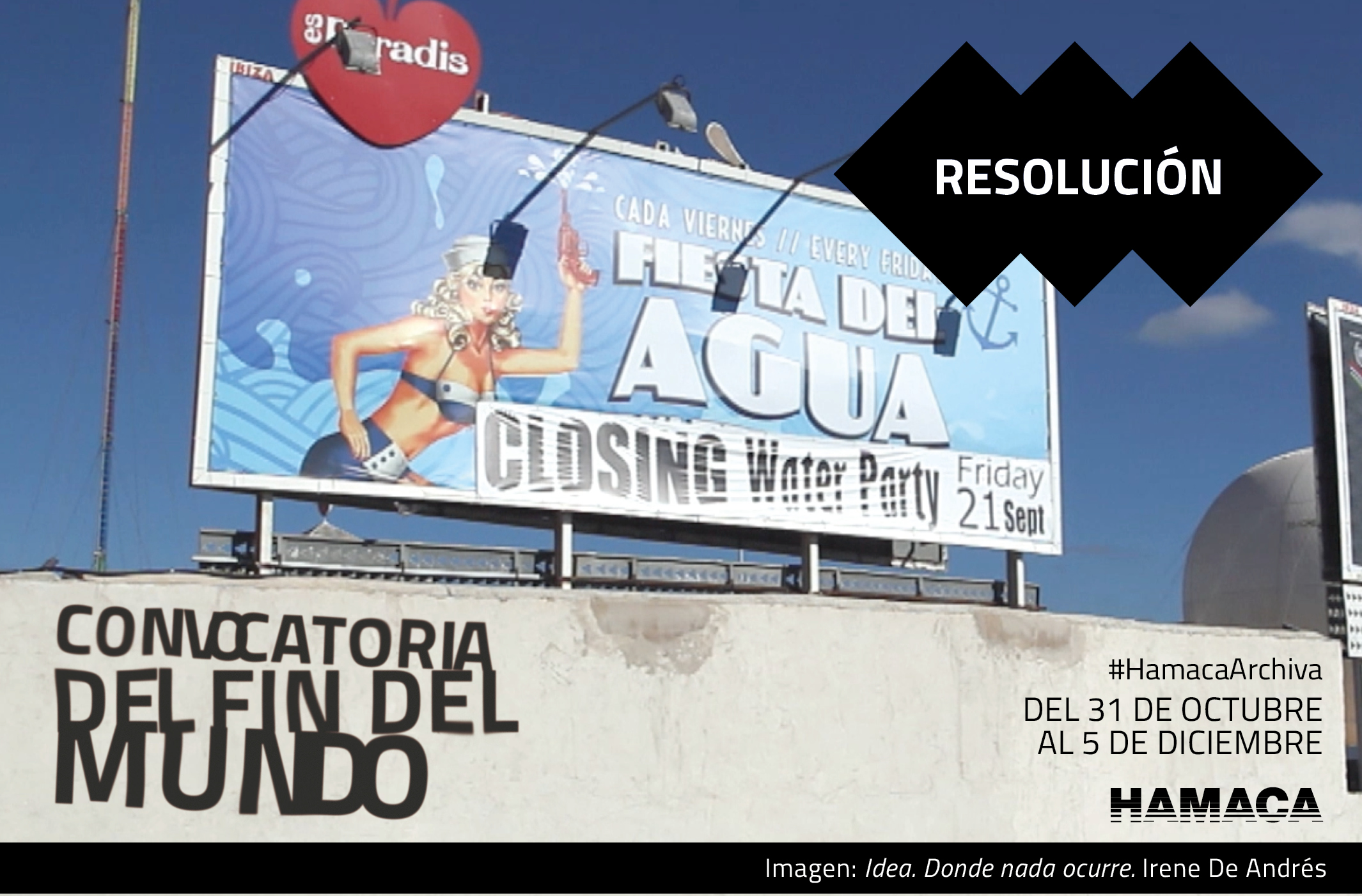
20 de desembre de 2022

S'ha fallat la primera convocatòria de la fi del món, en la qual 13 vídeos han estat seleccionats i formaran part del catàleg d'HAMACA per a ser arxivats, documentats i distribuïts a nivell estatal i internacional. Els criteris de selecció s'han basat en la pertinència i interès de les peces com a artefactes audiovisuals individuals i autònoms, i la seva rellevància per a ser incorporades en l'arxiu tant com elements significatius del d'audiovisual experimental com en relació a la temàtica de la convocatòria. Però també s'ha atès les tensions, ressonàncies i preguntes transversals entre el conjunt de peces seleccionades.
La fi del món ja va ser, molts mons ja van acabar, i el mondable tal com volem entendre-ho és una cosa tan radicalment material i operatiu com ficcional i per tant generatiu. I gràcies a la multitud de perspectives i sensibilitats portades a les ribes d'HAMACA pels realitzadors participants, hem aconseguit eixamplar la noció unívoca, singular, presentista i terminant de fi del món que impera. La convocatòria afirmava que "(s)e ha estès tremendament la decepció i angoixa cap al futur; la cerca d'un marc de seguretat, d'estabilitat o del senzill condueix reiterativament a binarismes enfrontats; la postveritat i estratègies de manipulació informativa van donant més i més lloc a pensaments conspiranoics; s'estén la desconfiança en la institució ciència —la pròpia institució ciència no ha estat a l'altura del pensament sociopolític dels temps. La crisi climàtica és una urgència a atendre i les circumstàncies permeten que es converteixi en un altre camp d'especulació del neoliberalisme o del que es coneix com a “capitalisme verd”. Així mateix, la intensitat i rapidesa a la qual estan subjectes els canvis geofísics i socials, així com el procés de degradació dels recursos planetaris, promou la sensació de pèrdua de sentit". La selecció recull extensions cap endarrere i als costats d'aquesta afirmació, en un temps no necessàriament lineal, entenent que amb el desenvolupisme dels 80's i els 90's ja es van acabar mons, que la violència colonial ha aconseguit sens dubte acabar amb molts mons i no obstant això en simultanejo altres nous, solidaris i exuberants continuen emergint, que els mons normatius capacitistes i expertocèntrics s'acaben amb les crisis ontoepistèmiques en sèrie i d'aquí emergeixen subjetivacions, tècniques i comunitats altres com les diskas, les llegues, les enebé. Que, potser també des dels arxius de l'audiovisual i com diu Paz Peña, "podem abraçar un present sostenible i un futur afirmatiu i pensar una tecnologia íntimament embullada amb el teixit social i amb nosaltres mateixes: una tecnologia per a la nostra adaptació als múltiples fins."(Paz Peña O., 2022)
Des del jurat, compost per Toni Navarro, Jara Rocha i l'equip d'HAMACA considerem que la representació dels fins de mons --desitjats o indesitjables-- continua sent clau en l'anàlisi contemporània de la realitat, sobretot en l'actual cicle semiopolític on des de posicions ultraconservadores una sèrie de discursos ecocides, feixistes i tecnosolucionistes continuen copant els àmbits de major visibilitat. Ens alegrem d'haver rebut tants materials i produccions que, amb diferents polítiques, escales i estètiques, ofereixen noves reflexions entorn de la crisi sociopolítica del règim petrocapitalisa patriarcocolonial.
Els vídeos seleccionats són:
Els vídeos es poden consultar a https://hamacaonline.net/titles/
Recolza:
